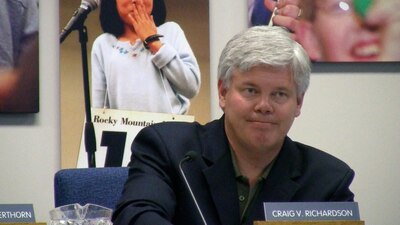Updated July 21 – Douglas County officials will not appear before the State Board of Education in August. Instead, state officials have told the district that, because the waivers they’re seeking for the new charter are automatic under state law, a letter of notification is sufficient. This story reflects the change.
CASTLE ROCK – As expected, Douglas County school board members on Tuesday gave the final nod of approval to a charter school that will serve as the administrative home of students with vouchers.

School board members voted unanimously June 27 to create the Choice Scholarship School but made that approval contingent upon a review of its charter school application by the district’s accountability committee.
With committee members’ comments in hand and a tweaked application, school board members voted to move ahead with the next step in the voucher pilot, formally known as the Choice Scholarship Program. The vote was 5-0, with two board members absent.
Some charter school leaders have criticized the use of the state’s charter law to implement the pilot. Yet neither that criticism nor multiple legal efforts to halt the voucher plan appear to have dampened the enthusiasm of Dougco school board members.
“I think this is a momentous time in the life of our Choice Scholarship Program,” board member Craig Richardson said before Tuesday’s vote. “I’m excited about this next step in our deployment of that program.”
The charter school needs one more stamp of approval but it’s procedural. Dougco officials are asking for a series of automatic waivers, typical of charters, and must notify the Colorado Department of Education of those they’re seeking. In return, state officials respond with a letter indicating receipt of the notification.
‘Nothing like this has been done anywhere’
Charter schools are usually created by outside groups – from parents to for-profit companies – who want to offer an alternative to traditional neighborhood schools. They form a board of directors, submit lengthy applications to school districts and plead for approval before school boards.
But the Dougco charter is different. District administrators wrote the application at the direction of the school board, which waived the usual application timeline and, on Tuesday, appointed the charter’s first board of directors. It consists of three parents of voucher students and two community members, including Ben DeGrow, an education policy analyst for the Independence Institute.
Even more unusual is that the voucher charter won’t have teachers or classrooms. Instead, up to 500 students will enroll in the school but they’ll take their vouchers totaling $4,575 in public funds – and their backpacks – to private schools.
By creating a charter, Dougco gets a state-assigned school number for funding purposes and can more easily track the attendance and testing of its voucher students. In the resolution approved Tuesday, the charter is described as “the most efficient way” of managing the pilot.
“As far as we know, nothing like this has been done anywhere,” Robert Ross, the district’s legal counsel, said last week. “There is not a pattern for this, we’re creating it.”
Responding to criticism from charter leaders
Using a charter school to implement the voucher pilot has sparked concern from some charter-school leaders.
When EdNews Colorado first wrote about the “voucher charter” concept in March, Alex Medler, who has long been active in the state and national charter movements, commented “this idea is extremely problematic” and “hopefully this is a non-starter.”
And Jim Griffin of the Colorado League of Charter Schools was quoted in the Denver Post as saying the Dougco charter application “just does not meet what we have adopted as quality standards for charter school applications.”
Tuesday, Richardson responded to criticisms that the Dougco voucher charter is a “sham.”
“I think that’s an unfortunate and somewhat shrill description of what may be a very legitimate policy difference,” he said. “Reasonable people can disagree about this …
“I would urge all of us to remember, including our friends in the charter community, this is about – let’s see what works, let’s see what doesn’t work and we’re very, very interested in their views.”
